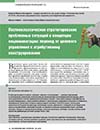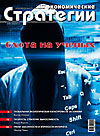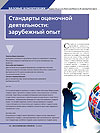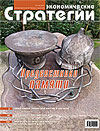Post-non-classical Strategizing of the Problem Situations in the Concept of Social Navigation: Transition from Target Management to Attributive Designing
DOI: 10.33917/es-8.166.2019.94-101
The article deals with issues related to the concept of “strategizing” — the evolution of ideas about strategizing (classical, non-classical, post-non-classical and post-classical approaches). A new understanding of the concept of problem-solving strategies is presented from the point of view of the concept of socionavigation, as a process of maneuvering using attribute design: management/regulation of intensity, direction (balance) and complexity of the discourse of a single creative field (EKP) with regard to the level of disequilibrium (K-level) system/environment, allowing to increase the efficiency of teamwork. A new construction of the notion “problem situation” is proposed as a non-zero conjunction of the actors’ ideas about the problem/ problems underlying the problem situation, their (actors) problem states and systems of key goals and values that form the problem-target area (PTA)






